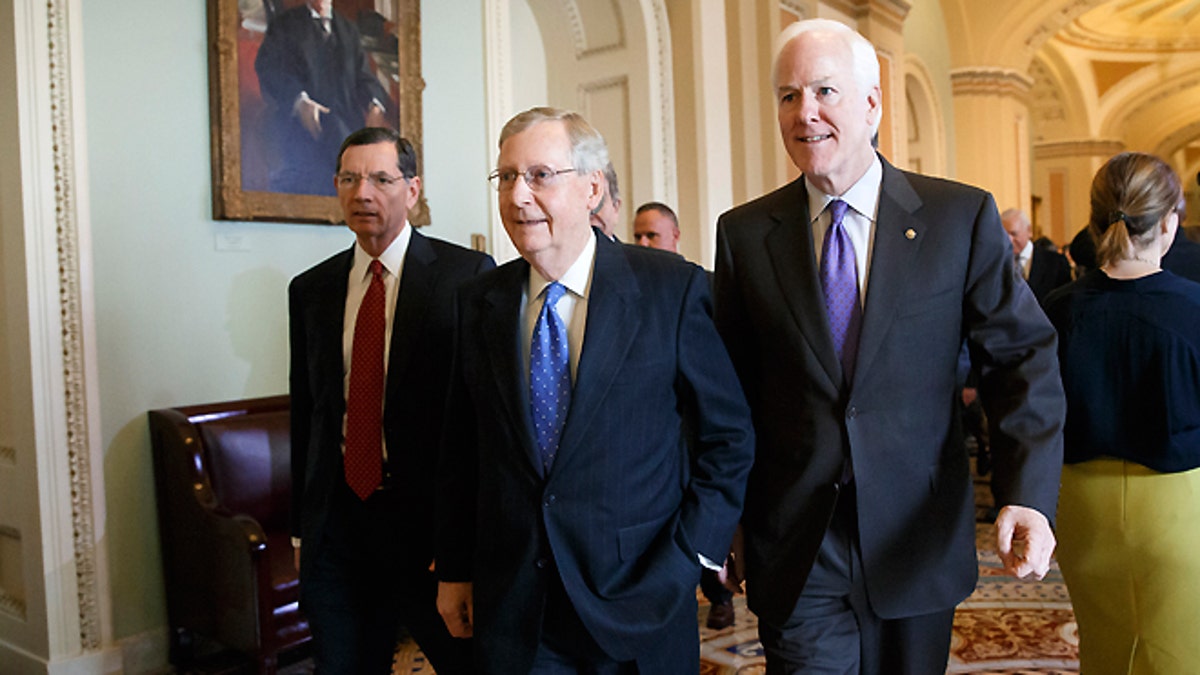
FILE -- Nov. 13, 2014: Senate Minority Leader Mitch McConnell of Ky., flanked by Sen. John Barrasso, R-Wyo., left, and Senate Minority Whip John Cornyn of Texas, emerges from a closed-door meeting on Capitol Hill in Washington, where he was chosen by acclamation of the GOP rank-and-file to be the new Senate majority leader when the new Congress convenes in January. (AP)
Congratulations! You won the election. After months if not years of hard work, you soaked up the cheers, popped the Champagne corks and measured the curtains for your new office. Before you get down to the business that occupies most new officeholders — raising money to run for re-election — consider this one thing: Your defeated opponent has an advantage over you.
Both of you will continue to encounter enemies who constantly look for an edge, but the person you just beat already has a powerful incentive to learn from past mistakes. He or she has every reason to show a little humility, to ask what went wrong and why, and to retool — thereby increasing the chances of being a much better competitor at life’s next contest, whatever it might be. [pullquote]
You, by contrast, are at risk of rolling down Hubris Avenue, as the Greeks used to call it. The Japanese call it Victory Disease. Overconfidence is the winner’s worst enemy. You might be thinking about your Greatest Achievement in the years to come (that is, in your spare time, when you are not raising money) and mentally smoothing down the chisel marks on your bust in the Rotunda.
Instead, you should be thinking about the ultimate formula for being a winning leader, which is rarely discussed and even more rarely followed. It’s not pursuing this or that policy agenda; it’s growing and getting better through the adversity of unexpected challenge. Sometimes it’s vaguely called “rising to the occasion,” but what it’s fundamentally about is learning on job — inevitably one that’s more difficult and unpredictable than any new entrant ever guesses.
Whatever his or her “previous experience,” no leader is ever completely ready for large-scale crisis when it comes. What wins in the face of huge and unforeseen challenge is not experience per se, but the ability of the leader to translate and adapt that experience into new action for the moment. They have learned from previous adversity what winning takes, and they keep learning into every new challenge.
All successful leaders learn on the job. A recent Exhibit A was Steve Jobs, who had to learn from his debacle at NeXT Computer before hitting home runs with the iPod and iPhone; so also with Alan Mulally, who pulled off an epic transformation of the floundering Ford Motor Company, even though he was new to the auto industry, by getting insights and help from a wide network of advisers, experts and even competitors. It was true of Margaret Thatcher, who learned from defeat the first time she stood for a seat in Parliament. Further back, history is full of shining examples. Abraham Lincoln taught himself to go to war, working his way through generals until he discovered the genius of Grant. Julius Caesar built his power by constantly adapting to the military tactics of his opponents and bringing those to future battles.
So how will you, Mr. or Ms. newly elected official, take your own first steps toward perhaps someday greatness — or at least being successful during your coming term? How will you start learning on the job better than others? Looking at successful leaders of the past, we suggest the following:
Break the Mirror: The greatest obstacle to learning from experience and building for the future is self-love. Great leaders always adopt some “strategic humility” — admitting when something has gone wrong that it may be their fault, too. And then they think about the lessons for the future, and what they will do differently next time.
Call on Networks That Challenge You: Another pitfall that so many would-be leaders fall into is yes-men counselors: surrounding themselves with protective and always-ready-to-praise-and-agree advisers. Great leaders look beyond a favoring circle, gathering ideas from and framing solutions with the input of both internal and external experts and non-experts, benefiting from their diverse perspectives.
Build Strategy by Looking Back as Well as Looking Ahead: Great leaders “try to see around corners” and imagine future scenarios as they build new solutions. But they do so by also reflecting on where they have been, and by learning from the mistakes of both themselves and others before. Instead of ignoring the past — “this time is different” — and whitewashing previous missteps, they embrace what can be learned from the last time they were new on the job for something else.
So, dear elected official, congratulations again on your new term. Tomorrow begins the first day of the rest of your political life. Your hopes of making it a long one depend on also beginning a new day of learning on the job.
